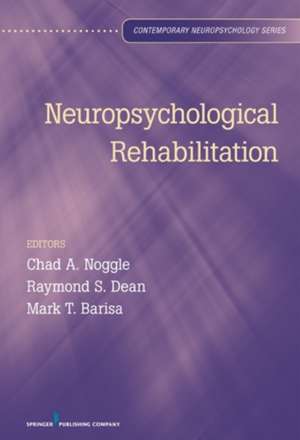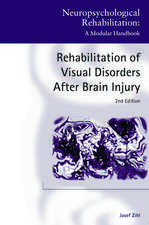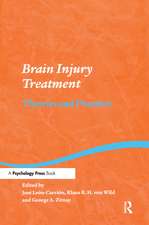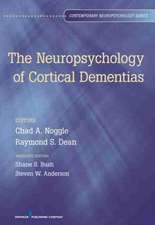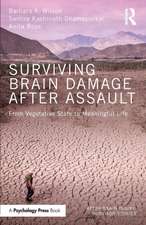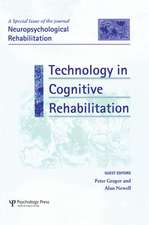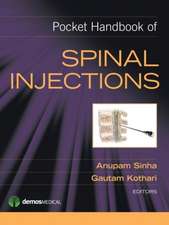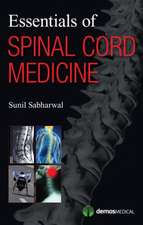Neuropsychological Rehabilitation: Contemporary Neuropsychology
Editat de Chad Noggle, Raymond Dean, Mark Barisaen Limba Engleză Hardback – 25 apr 2013
"Neuropsychological Rehabilitation" provides useful introductory material and background information on various disorders, assessments, and rehabilitative interventions for adult and geriatric populations...This book is essential for psychologists or clinical neuropsychologists who have a strong interest in understanding the current medical aspects of neuropsychological rehabilitation."--PsycCRITIQUES
This volume disseminates knowledge about the most advanced practices and techniques in the rehabilitation of neuropsychological deficits, covering both specific neuropsychological domains and approaches in neurorehabilitation. It adheres to the philosophy that it is not enough to identify a deficit or diagnose a disease unless doing so helps to direct rehabilitation efforts to improve function. Intended to advance clinical skills, the book goes beyond surface diagnostic practice to foster rehabilitative efforts in response to residual deficits and disease.
The volume begins by addressing the foundations of neuropsychology in rehabilitation and discussing, in depth, domain-specific rehabilitation practices, with a focus on functioning. This is followed by a discussion of supplemental applications and practices that go beyond function-specific methodology including neuroimaging and pharmacological agents. Also covered is the role of system/environmental manipulation and transitioning strategies. The final section attends to those presentations/groupings most commonly seen in rehabilitation practice for which there is no prototypical form. Key Features:
Presents in depth the most advanced clinical applications for neuropsychological rehabilitation Covers neuropsychological rehabilitation in terms of specific cognitive domains (attention, language, memory) and approaches to and practices in neurorehabilitation (neuroimaging, vocational rehabilitation, pharmacological rehabilitation) Written by the foremost scholars in the field
Preț: 865.20 lei
Preț vechi: 910.74 lei
-5% Nou
165.58€ • 171.05$ • 137.80£
Carte disponibilă
Livrare economică 05-19 martie
Specificații
ISBN-10: 0826107141
Pagini: 376
Dimensiuni: 178 x 254 x 25 mm
Greutate: 0.79 kg
Ediția:New.
Editura: Springer
Seria Contemporary Neuropsychology
Notă biografică
|| Raymond S. Dean, PhD, is Past President of the Clinical Neuropsychology Division of the APA and the National Academy of Neuropsychology. He has been the George and Frances Ball Distinguished Professor of Neuropsychology and Director of the Neuropsychology Laboratory at Ball State University since 1984. As a Parachek-Frazier Research Fellow, he completed a Ph.D. in School/Child Clinical Psychology at Arizona State University in 1978. Dr. Dean completed an internship focused on neuropsychology at the Arizona Neuropsychiatric Hospital and postdoctoral work at the University of Wisconsin at Madison. He has been awarded the Lightner Witmer Award by the School Psychology Division of the American Psychological Association and both the Outstanding Contribution Award from the National Academy of Neuropsychology and the Early Contribution Award by Division 15 of the APA. In addition to his academic appointments, Dr. Dean served as Distinguished Visiting Faculty at the Staff College of the NIMH. He is a Diplomate of the American Board of Professional Psychology, the American Board of Professional Neuropsychology, and the American Board of Pediatric Neuropsychology. He is a Fellow of the American Psychological Association (Divisions: Clinical, Educational, School and Clinical Neuropsychology), the National Academy of Neuropsychology, and the American Psychopathological Association. He also served as Editor of the Archives of Clinical Neuropsychology, Journal of School Psychology and the Bulletin of the National Academy of Neuropsychology. Dr. Dean has published some 500 research articles, books, chapters and tests, including the Dean-Woodcock Neuropsychological Assessment System, one of the most important and often-cited neuropsychological assessment batteries. He is co-editor of The Encyclopedia of Neuropsychological Disorders, also to be published through Springer Publishing Company as well as the co-editor of the Contemporary Neuropsychology series. For his work he has been recognized by awards from the National Academy of Neuropsychology, the Journal of School Psychology, and the Clinical Neuropsychology Division of APA.
| Mark T. Barisa, PhD, ABPP, is a board certified clinical neuropsychologist at the Baylor Institute for Rehabilitation in Dallas, TX. He is a Diplomate of the American Board of Professional Psychology in Clinical Neuropsychology and is active in numerous professional organizations including AACN, NAN, and APA (Divisions 40 and 22). Dr. Barisa is a licensed a clinical psychologist in Texas and Indiana. He has worked in a variety of clinical settings, including administrative positions, while maintaining teaching and training activities for pre-doctoral interns and post-doctoral residents. He is active in research and has presented at numerous local, national, and international on neuropsychology, rehabilitation psychology, and the business aspects of psychological practice. Dr. Barisa is the author of the forthcoming book The Business of Neuropsychology: A Practical Guide. His research and clinical interests have focused on outcome measurement in rehabilitation, differential diagnosis of dementia, functional correlates of neuropsychological data, and return to work issues following injury/illness.
Textul de pe ultima copertă
This volume disseminates knowledge about the most advanced practices and techniques in the rehabilitation of neuropsychological deficits, covering both specific neuropsychological domains and approaches in neurorehabilitation. It adheres to the philosophy that it is not enough to identify a deficit or diagnose a disease unless doing so helps to direct rehabilitation efforts to improve function. Intended to advance clinical skills, the book goes beyond surface diagnostic practice to foster rehabilitative efforts in response to residual deficits and disease.
The volume begins by addressing the foundations of neuropsychology in rehabilitation and discussing, in depth, domain-specific rehabilitation practices, with a focus on functioning. This is followed by a discussion of supplemental applications and practices that go beyond function-specific methodology including neuroimaging and pharmacological agents. Also covered is the role of system/environmental manipulation and transitioning strategies. The final section attends to those presentations/groupings most commonly seen in rehabilitation practice for which there is no prototypical form. Key Features:
Presents in depth the most advanced clinical applications for neuropsychological rehabilitation Covers neuropsychological rehabilitation in terms of specific cognitive domains (attention, language, memory) and approaches to and practices in neurorehabilitation (neuroimaging, vocational rehabilitation, pharmacological rehabilitation) Written by the foremost scholars in the field "
